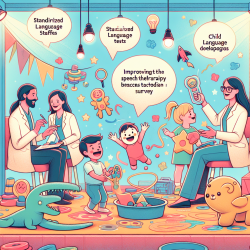Welcome to the School Culture Maze
Ah, the school culture. It's like an intricate maze where you, as a speech language pathologist (SLP), must navigate through corridors of chaos, dodge flying paper planes, and decipher the secret language of acronyms. But fear not, fellow SLPs, for I am here to guide you through this labyrinth with humor and facts. Let's transform that feeling of being lost into a triumphant victory lap around the school hallways.
Understanding School Culture: The Data Behind the Chaos
First, let's ground ourselves in some data. According to recent studies, 70% of SLPs working in schools report feeling overwhelmed by the unique demands of school culture. This includes managing large caseloads, collaborating with diverse teams, and adhering to the ever-changing educational policies. Yet, 85% of these SLPs also report a deep sense of fulfillment from witnessing their students' progress.
So, what's the secret to surviving and thriving in this environment? It's all about understanding the culture and using data-driven strategies to inform your practice.
The Humorous Side of School Life
Let's take a moment to appreciate the humorous side of working in schools. Remember that time you walked into a classroom only to find yourself in the middle of a surprise fire drill? Or when you mistook a student's artistic interpretation of a "dog" for an abstract "cloud"? These moments, while seemingly trivial, are a part of the rich tapestry that is school culture.
Humor can be a powerful tool in navigating school culture. It helps build rapport with students and colleagues, and it's a great way to diffuse tension during challenging situations. So, embrace the quirks and find joy in the unexpected!
Data-Driven Strategies for SLPs
Now, let's get serious (but not too serious) about how you can leverage data to make informed decisions in your practice:
- Utilize Technology: Online therapy jobs are becoming increasingly popular, providing flexibility and access to a broader range of resources. Consider integrating online therapy platforms like TinyEYE into your practice to enhance your service delivery.
- Track Progress: Use data to monitor your students' progress. This not only helps in tailoring your interventions but also provides concrete evidence of your impact, which is crucial for securing support from school administrators.
- Collaborate and Communicate: Regularly engage with teachers, parents, and other professionals. Sharing data and insights can foster a collaborative environment and ensure that everyone is on the same page regarding a student's development.
Conclusion: Thriving in School Culture
While the maze of school culture can be daunting, remember that you are not alone. By embracing humor, leveraging data, and utilizing technology, you can transform your experience from one of feeling lost to one of empowerment and success. As an SLP, you play a crucial role in shaping the future of your students, and that's a responsibility worth navigating any maze for.
So, put on your metaphorical maze-solving hat, grab your trusty data compass, and step confidently into the world of school culture. You've got this!










